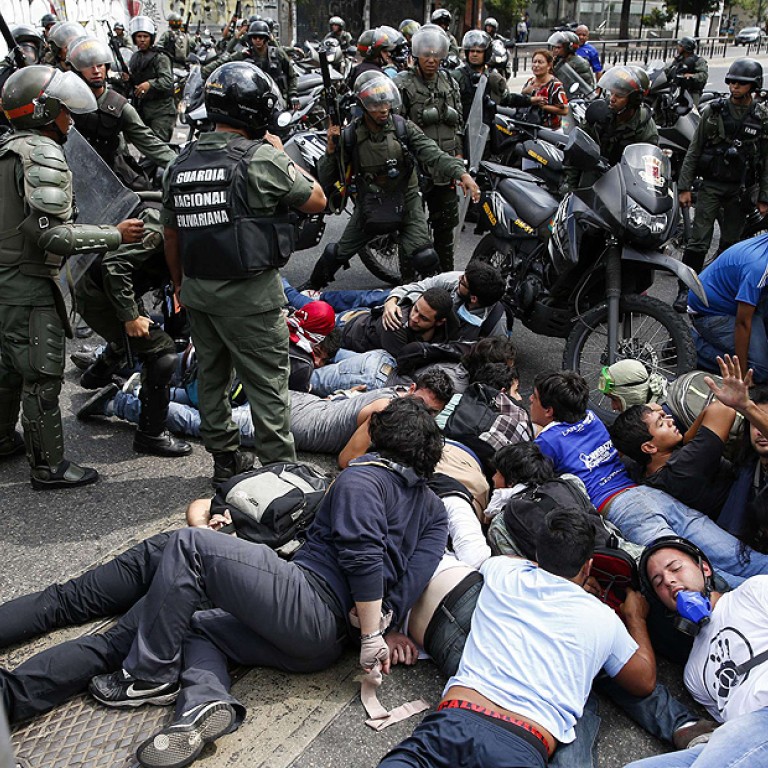
Protests heat up in Venezuela amid opposition rift over US sanctions
Venezuelan security forces arrested scores of people on Wednesday during a sweep of a busy Caracas avenue as protests against the government stepped up even as a rift opened within the opposition over whether to back US sanctions.
The protest and police response comes as month-old negotiations aimed at easing tensions hang in the balance. The opposition on Tuesday froze talks with President Nicolas Maduro’s government, saying the climate for dialogue was impossible after the mass arrest last week of 200 student protesters who had been camping for weeks outside the offices of the United Nations and nearby plazas.
Many political observers believe that by freezing the talks opposition leaders were caving to pressure from their own radical base, which is fuming following confusing statements about sanctions made by the top US diplomat to Latin America, Assistant Secretary of State Roberta Jacobson.
Jacobson testified last week in the US Senate that some members of Venezuela’s opposition are urging the White House to keep on ice a proposal to bans visas and seize the assets of Venezuelan officials suspected of committing human rights abuses during the past three months of unrest.
In a fiery exchange with Florida Republican Marco Rubio, Jacobson said the restraint is needed so as not to endanger the outcome of the crisis talks and that members of the opposition sitting across the table from the government had explicitly asked the State Department for more time before imposing any sanctions.
On Wednesday, Jacobson retracted her comment, telling reporters in Washington that she ‘misspoke’ and that nobody participating in the dialogue had made such a request.
But her comments became a political hot potato for the opposition, with Ramon Guillermo Aveledo, the professorial, mild-spoken head of the Democratic Unity alliance, denying any such plea was made. Meanwhile, students and hardliners boycotting the talks seized on Jacobson’s comments, and Aveledo’s failure to call for sanctions, as proof of betrayal.

Divisions within the opposition had been apparent for some time, with moderates objecting to the timing of mass protests in February just two months after the government prevailed in mayoral elections.
Key to the strategy of hard-line groups looking to force Maduro’s resignation is rallying international opinion against his government. Moderate opposition leaders supported the talks.
“There’s a clear division in the opposition about whether you play the game of politics or seek international intervention,” David Smilde, an analyst for US NGO the Washington Office on Latin America, said in an interview from Caracas.
Even some members of the opposition, if not their leaders, acknowledge that sanctions would be counterproductive, possibly setting up the Obama administration to be blamed for Venezuela’s economic troubles much like the Washington’s half-century embargo against Cuba is used to bolster domestic and regional support for that country’s communist government.
Even before Tuesday’s suspension, the talks had seemed to be souring.
Progress on a range of issues, from the opposition’s proposal of an amnesty for jailed activists and the filling of positions on the national electoral council, had been almost non-existent.
Against opposition calls for a non-partisan truth commission to investigate the 41 deaths on both sides, the government recently said it was going ahead with its own probe headed by National Assembly President Diosdado Cabello, a Maduro ally.
Foreign ministers of Brazil, Colombia and Ecuador are travelling to Caracas on Thursday in attempt to patch things up and restart the talks.
Meanwhile the crackdown continues.

On Wednesday, National Guardsmen fired tear gas and rubber bullets to break up a protest of a few dozen students. Office workers scrambled for cover and adolescent high school students were among those restrained with plastic handcuffs and hauled away.
Such aggressive tactics are likely to further enrage Maduro’s opponents.
Edgard Gutierrez, a political analyst the Catholic University in Caracas, said that regardless of confusing statements out of Washington, the opposition-government dialogue was doomed to failure given how polarised Venezuela remains.
“What’s paradoxical is that the rift is deeper just as the opposition is confronting a weaker rival.”
